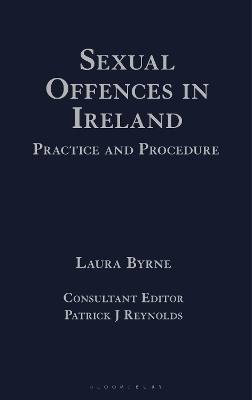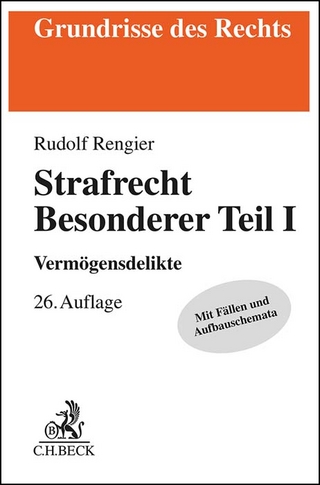
Sexual Offences in Ireland: Practice and Procedure
Bloomsbury Professional (Verlag)
978-1-5265-2700-4 (ISBN)
- Titel nicht im Sortiment
- Artikel merken
Sexual Offences: Practice and Procedure will greatly assist practitioners engaged in a criminal trial dealing with a sexual offence in relation to all aspects of the prosecution. It will be very useful for practitioners making a legal argument at trial or in appeals against conviction or sentence. With detailed guidance on procedural aspects of sexual offences trials, it is a must-have title for preparing your defence and advising your client.
It covers:
- DPP v FE [2019] IESC 85 (sentencing guidelines/ranges for rape)
- DPP v FN [2022] IESC 22 (Supreme Court on the question of indecency in relation to sexual assault)
- CW v DPP [2022] IEHC 336 (regarding reasonable mistake defence for defilement offences)
- Criminal Law (Sexual Offences) Act 2017
- Criminal Justice (Victims of Crime) Act 2017
- Criminal Procedure Act 2021 and the Children (Amendment) Act 2021
This title is included in Bloomsbury Professional's Irish Criminal Law online service.
Author: Laura Byrne Laura Byrne is a practising barrister on the Western Circuit with a keen interest in criminal law. Outside of her own practice, she is regularly tasked by other practitioners to draft their legal submissions for the Court of Appeal and the Supreme Court. She is passionate about the legal practice and procedure in criminal law. Laura holds a PhD from Trinity College Dublin and the title of her thesis was ‘The Potential Role of the Right to Procreative Autonomy in Relation to the Regulation of Assisted Reproductive Technologies in Irish Law’. Laura graduated with a BCL (International) undergraduate degree from University College Dublin, an LLM (Masters in Law) from Cambridge University and an Advanced Diploma in Applied Employment Law from Kings Inns, Dublin. She is author of the monthly Irish Criminal Law Update on Bloomsbury Professional Online. Laura published a paper in a British family law publication entitled ‘The Parental Right to Make Mistakes and Irish Constitutional Reform’, in H. Keating and C. Lind (eds), Transforming Families and Regulating Responsibilities (2011). She has presented a number papers in criminal law to Western Circuit CPDs for the Bar Council and presents conference papers in Irish and UK academic conferences in areas of family law. She has lectured in University College Dublin, Trinity College and the University of Galway. Consultant Editor: Patrick J Reynolds BL Patrick J Reynolds is an experienced criminal junior counsel. He practises in Dublin and has been prosecuting counsel for County of Mayo for a number of years. He is a member of the Bar of England and Wales, and practised criminal law in London before returning to practise in Ireland in 2002. Patrick has wide experience in prosecuting and defending sexual offences trials in the Central Criminal Court and Circuit Court and has invaluable practical experience on the developments in the area in relation to trial procedure, the role of victims and special measures for vulnerable witnesses.
1. Introduction- Legislative History/Overview
Preliminary Stages of Investigation and Prosecution
2. Investigation - Vulnerable Complainants - Children and Persons with Mental Disorders
Garda Interviews etc.
Section 15 of the 2017 Act- assessments by members of An Garda Síochána about need for special requirements- linked to Ground Rules hearings
Decision to Prosecute and Role of the Victim if Prosecution not Directed
3. Practice and Procedure where Accused is a Minor
4. Judicial Review proceedings and Sexual Offences /
Prohibition of trial on the grounds of delay - when is judicial review an appropriate option as opposed to trial court / bars to a fair trial.
5. Disclosure - including counselling records
6. Preliminary Hearings
Ground Rule Hearings, Pre-Trial Hearings under 2021 Act
Accommodations for Witnesses - Intermediaries, Video Link, Interpreters
Trial of Offences
7. Reporting Restrictions and Restrictions on the Public Attending Court
8. Drafting the Indictment - Joining co-accused, sample counts and joining more than one complainant -
Applications to sever the indictment/ for separate trials
Similar fact evidence DPP v Clement Limens (2020 Supreme Court)
9. Cross examination of complainant and previous sexual history
Recent legislative developments and case law
Right to separate legal representation
10. Corroboration
11. Rule Against Hearsay and relevant exceptions, including Doctrine of Recent Complaint / previous statements
12. Misconduct Evidence of the Accused/ Character Evidence
13. Applications at Close of Prosecution Case
Amending the Indictment
Application for Directions
Galbraith, bars to a fair trial - delay/ adverse publicity
14. Judge’s Charge
Corroboration warning
Delay Warning
Requisitions on Charge for DPP v Cronin
15. Verdict
Reporting Restrictions
Re-trials
Lifting of reporting restrictions after not guilty verdict / distinct position sexual offences
Section 3: Sentencing
16. Sentencing I
Guidelines, comparators and important decisions for sentencing principles and structure in each of the sexual offences (rape, sexual assault, indecent assault, defilement, exploitation, child pornography):
Consideration of DPP v FE regarding rape guidelines
Sentencing for Child Pornography
17. Sentencing II
Common Aggravating and Mitigating Factors in all offences
Concurrent/ Consecutive - Multiple Complainants/ Multiple Offences/ Totality Principle
Question of Repeat Offenders
Victim Impact Statements
18. Ancillary Orders
Notification requirements Sex Offenders Act 2001 - when, how long, implications of failure to comply
Sex Offender Orders under Part 3 of the 2001 Act - Separate Applications
| Erscheint lt. Verlag | 18.9.2025 |
|---|---|
| Verlagsort | London |
| Sprache | englisch |
| Maße | 156 x 248 mm |
| Themenwelt | Recht / Steuern ► EU / Internationales Recht |
| Recht / Steuern ► Strafrecht ► Besonderes Strafrecht | |
| Recht / Steuern ► Strafrecht ► Strafverfahrensrecht | |
| Sozialwissenschaften ► Soziologie ► Gender Studies | |
| ISBN-10 | 1-5265-2700-6 / 1526527006 |
| ISBN-13 | 978-1-5265-2700-4 / 9781526527004 |
| Zustand | Neuware |
| Haben Sie eine Frage zum Produkt? |
aus dem Bereich


